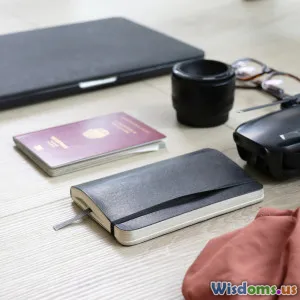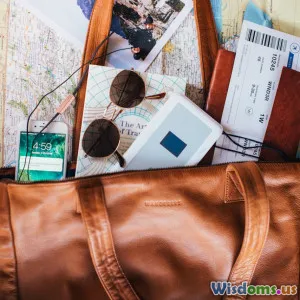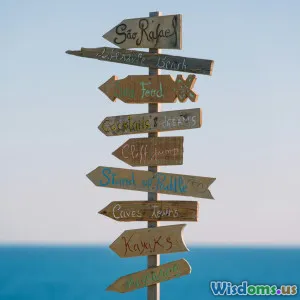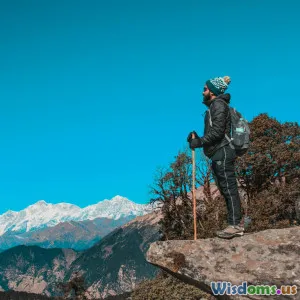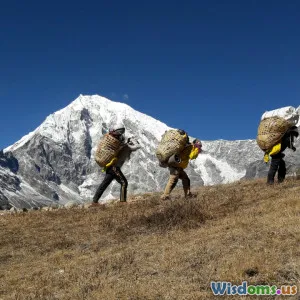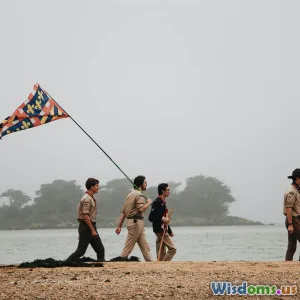
Seven Budget Tricks Backpackers Swear By for Epic Journeys
10 min read Discover seven clever budget hacks backpackers rely on to maximize their adventures without breaking the bank. (0 Reviews)
Seven Budget Tricks Backpackers Swear By for Epic Journeys
Embarking on a backpacking adventure brings with it the thrill of exploring new horizons and cultures. Yet, the question that often weighs on many travelers’ minds is: How can I make this journey affordable without sacrificing experience? The truth is, budget backpacking isn’t about traveling cheaply but traveling smartly—using tricks and tips to stretch your dollar and maximize your enjoyment. In this article, we unveil seven essential budget tricks that seasoned backpackers swear by to craft unforgettable, wallet-friendly adventures.
1. Master the Art of Budget Accommodation
Accommodation often accounts for the lion’s share of travel expenses. Backpackers worldwide have fine-tuned methods to secure comfy stays without breaking the bank.
Embrace Hostels and Guesthouses
Hostels remain the cornerstone of budget travel for a reason—they offer social vibes, essential amenities, and unbeatable prices. According to Hostelworld, the average dorm bed globally costs between $10-$20 per night, a fraction of hotels.
Example: In Southeast Asia, countries like Thailand and Vietnam boast hostels where you can sleep for as low as $5 a night. Booking in advance via reliable platforms or showing up early can score you even better deals.
Use Couchsurfing and Work-Exchange Platforms
The Couchsurfing community connects travelers with locals offering free accommodation, fostering cultural exchange. Moreover, work-exchange sites like Workaway or WWOOF allow you to trade labor—such as farming or hostel shifts—for lodging.
This not only eliminates accommodation costs but immerses you deeply into local life. For instance, volunteering at a vineyard in Spain might cover room and board, all while enhancing your cultural experience.
Leverage Last-Minute Booking Apps
Apps like HotelTonight offer discounted rooms on short notice, capitalizing on last-minute cancellations. While not always predictable, this trick can save serious cash for spontaneous backpackers.
2. Eat Like a Local, Not a Tourist
Food can be a major budget drain—especially in touristy areas. The secret is to eat where locals eat.
Street Food Over Restaurants
Street food often offers authentic flavors and extremely affordable prices. For example, in Mexico City, tacos from street vendors can cost as little as $1 each versus expensive sit-down meals.
Moreover, sampling local produce markets not only costs less but gives first-hand insight into regional treasures.
Shop at Grocery Stores and Self-Cater
If your accommodation has a kitchen, self-catering is a great money saver. Purchase local staples like rice, beans, and eggs to prepare nutritious meals. A 2023 study by Travel Economist showed travelers could save up to 40% on food costs by cooking during trips.
Avoid Tourist Traps
Restaurants near popular landmarks inflate prices to cash in on foot traffic. Walking just a few blocks away often leads to cheaper, more authentic eateries.
3. Opt for Slow Travel and Public Transport
Fast travel often means spending big on flights or taxis. Slow travel—moving at a relaxed pace—enables savings on transportation and offers deeper local connections.
Utilize Buses and Trains
In many countries, buses are the cheapest way to get around. For example, in India, long-distance bus travel can cost mere dollars. European rails offer budget passes like the Eurail pass, facilitating affordable multi-destination trips.
Hitchhiking and Ridesharing
Though it requires caution and research, hitchhiking remains a valid cost-saving method in several regions.
Ridesharing platforms—like BlaBlaCar in Europe—connect drivers and travelers sharing costs, often at a fraction of public transport prices.
Walk or Bike Whenever Possible
Exploring by foot or rent-a-bike not only saves money but allows immersive experiences. Urban hubs like Amsterdam or Copenhagen are famous for cycling culture, promoting eco-friendly budget travel.
4. Plan and Book Smartly
Although spontaneity has its charm, intelligent planning reduces costs significantly.
Book Flights on Cheaper Days
Research from Skyscanner shows that the cheapest days to book flights are typically Tuesdays and Wednesdays. Flying mid-week also tends to yield lower prices.
Use Price Alerts and Comparison Tools
Platforms like Google Flights and Kayak allow setting alerts to monitor fare fluctuations, helping you book when prices drop.
Travel Off-Peak
Traveling in shoulder or low seasons means less competition. For example, visiting Mediterranean countries in early autumn rather than summer reduces accommodation costs by up to 50%, according to Booking.com data.
5. Use Technology to Your Advantage
Smartphone apps and online tools are invaluable for budget backpackers.
Currency Conversion and Budget Tracking
Apps like XE Currency prevent costly mistakes by offering real-time exchange rates. Meanwhile, budgeting apps like Trail Wallet help monitor spending to keep finances on track.
Free Activities Apps
Many destinations have apps or websites listing free or cheap events, guided tours, or museum days. For instance, New York City offers a free museum day monthly, perfect for culture lovers on a budget.
Travel Forums and Social Media Groups
Communities such as Reddit’s r/Backpacking or Lonely Planet forums provide insights, safety tips, and real-time advice tailored to your destination.
6. Pack Light and Smart
While not an obvious cost hack, traveling light can save money.
Avoid Checked Baggage Fees
Airlines often charge hefty fees for checked bags. Packing a versatile carry-on keeps transportation costs down. For example, budget carriers like Ryanair charge upwards of $60 for checked luggage.
Essential Gear
Investing in lightweight, multipurpose gear prevents unnecessary purchases on the road or paying to ship forgotten items home.
The 10-Item Wardrobe Trick
Backpackers like Linda Åkeson McGurk, author of "Packing Light," advocate for a minimalist wardrobe that mixes and matches, which keeps your bag streamlined and your journey easier.
7. Embrace the Local Freebies and Community
Finally, one underrated budget strategy is tapping into local generosity and events.
Attend Local Festivals and Markets
Many festivals are free for entry and offer entertainment and cultural exchange without cost, such as the Lantern Festival in Taiwan or local farmers’ markets worldwide.
Free Walking Tours
Cities worldwide offer free walking tours operated on a tips-only basis. These tours give exceptional context on local history and culture. For example, in Berlin or Prague, you can gain hours of insightful guidance by tipping what you can afford.
Use Libraries and Community Centers
In many cities, public libraries provide free wifi, clean restrooms, and travel information.
Conclusion: Budget Travel is About Being Resourceful
Backpacking epic journeys on a budget is far from compromising experiences— it’s about traveling smarter. By embracing budget accommodations, local foods, slow and shared transport, tech tools, and community engagement, travelers can unlock rich, meaningful adventures for less.
Remember the words of veteran backpacker Rick Steves: "Travel is rich with perspective when you break out of your comfort zone but even richer when you bring savvy and sensitivity to the journey."
Ultimately, these budget tricks create more than savings; they forge connections and deepen solo traveler empowerment. So pack your bags, plan wisely, and let your wallet empower your next grand adventure.
Written by a seasoned travel writer researching backpacker strategies globally, equipped with data and real-world cultural insights.
Rate the Post
User Reviews
Popular Posts











